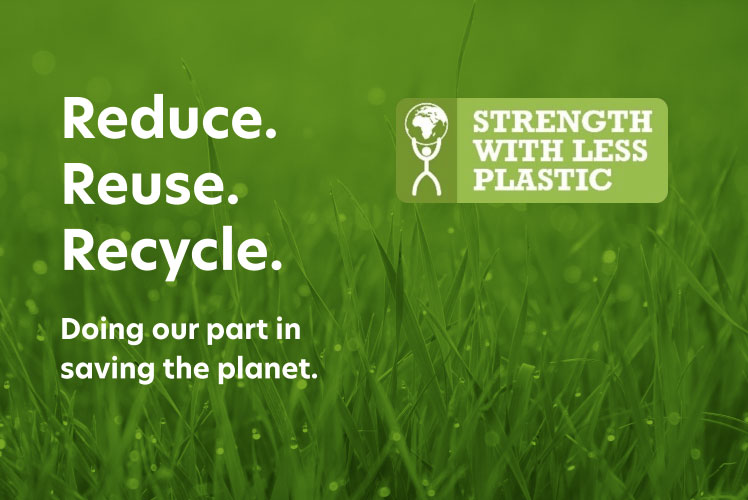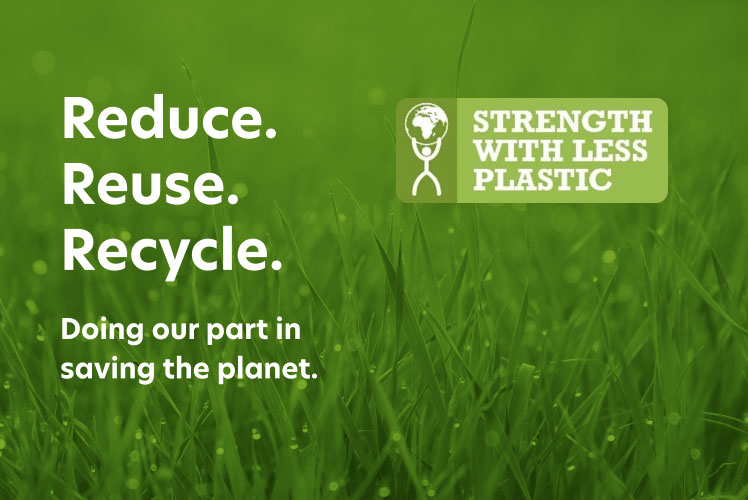The carbon footprint of the Kordis products is an important factor in their design. The following elements are all considered seriously when designing a product, but the primary strategic direction we follow is the policy of REDUCE then REUSE then RECYCLE. This is the clearly stated policy of major environmental groups.
Kordis believes that the priority is to design a product in an environmentally responsible way, which means to REDUCE the material content to the minimum required for the product to perform correctly.
We believe that with many products in this sector there is plenty of scope to reduce the thickness, and occasionally the size, through the intelligent use of high performance polymers that have very high physical strength at low thickness.
By reducing the total amount of raw material used it is possible to generate significant environmental benefits:
- The reduction of original raw material production (oil or gas) costs and energy, as less material is used.
- The reduction of associated energy costs in delivering the raw material to the factory.
- Reduced energy in producing the final (thinner) product.
- Reduced energy in transporting the finished product through the logistics network to the retailers and consumers.
- Reduced thickness of product leads to a smaller pack and therefore lower packaging costs and less material use.
Similar benefits for the retailer and consumer in selling a thinner, lighter product which performs as well as, or sometimes better than, current products.

Recycling should not be the first response
Producing a bin liner or refuse bag from recycled material can often be less environmentally friendly than might first appear as the bag frequently has to be made thicker to cope with the inherent weakness of contaminated recycled material.
As a result, bags made from recycled material are usually compromised in their physical properties at the same thickness as products made from “virgin” material, or they have to be made much thicker, often 25% to 50%, in order to be as strong as “virgin” products.
Producing a bin liner or refuse bag from recycled material also has hidden energy levels incorporated within it, such as:
- The energy costs and water associated with the collection, sorting, and cleaning the material.
- The energy used in transporting the recycled material to the factory where it is used, which is often a different company than that which recycles the material.
- The extra energy involved in producing a thicker product.
- The extra energy and packaging used in transporting and handling a thicker product by the logistics partners, retailers and ultimately the consumer of the products.
At Kordis we believe Recycling has a purpose in certain situations when the product is at the end of its useful life and needs to be disposed of but only if it does not require a product to be made thicker and only after following the golden rule of REDUCE, REUSE then RECYCLE

Biodegradable or Compostable?
At Kordis we distinguish clearly between products which claim to be made from degradable materials and those which are compostable.
We believe that degradable is often a confusing and sometimes misunderstood concept which could cover additives in a blend which simply assists the plastic film to breakdown into smaller particles. These smaller particles may not then decompose and so the plastic may not be disposed of in an environmentally responsible manner.
Genuine compostable materials are different in that they are designed to completely breakdown into CO2 ( Carbon Dioxide) and water. Materials that make this claim need to conform to various internationally recognised standards such as EN13432 and OK Home Compost. Kordis is able to supply such products for the relevant applications, such as for Caddy Bags to collect home food waste for home composting.
From a strictly environmental benefit point of view it is however worth considering if a composting system which produces CO2 - a major greenhouse gas - (which is a by-product of the composting process) is something to be encouraged, or whether it makes more sense to reduce the food waste significantly in the first place. Nevertheless in certain applications it may be appropriate to use such products.
